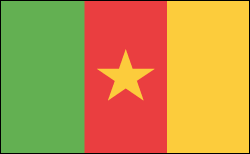
Geography
Cameroon is a Central African nation on the Gulf of Guinea, bordered by Nigeria, Chad, the Central African Republic, the Republic of Congo, Equatorial Guinea, and Gabon. It is nearly twice the size of Oregon. Mount Cameroon (13,350 ft; 4,069 m), near the coast, is the highest elevation in the country. The main rivers are the Benue, Nyong, and Sanaga.
Government
After a 1972 plebiscite, a unitary republic was formed out of East and West Cameroon to replace the former federal republic.
History
Bantu speakers were among the first groups to settle Cameroon, followed by the Muslim Fulani in the 18th and 19th centuries. The land escaped colonial rule until 1884, when treaties with tribal chiefs brought the area under German domination. After World War I, the League of Nations gave the French a mandate over 80% of the area, and the British 20% adjacent to Nigeria. After World War II, when the country came under a UN trusteeship in 1946, self-government was granted, and the Cameroon People's Union emerged as the dominant party by campaigning for reunification of French and British Cameroon and for independence. Accused of being under Communist control, the party waged a campaign of revolutionary terror from 1955 to 1958, when it was crushed. In British Cameroon, unification was also promoted by the leading party, the Kamerun National Democratic Party, led by John Foncha.
France set up Cameroon as an autonomous state in 1957, and the next year its legislative assembly voted for independence by 1960. In 1959 a fully autonomous government of Cameroon was formed under Ahmadou Ahidjo. Cameroon became an independent republic on Jan. 1, 1960. In 1961 the southern part of the British territory joined the new Federal Republic of Cameroon and the northern section voted for unification with Nigeria. The president of Cameroon since independence, Ahmadou Ahidjo was replaced in 1982 by the prime minister, Paul Biya. Both administrations have been authoritarian.
With the expansion of oil, timber, and coffee exports, the economy has continued to improve, although corruption is prevalent, and environmental degradation remains a concern. In June 2000 the World Bank agreed to provide more than $200 million to build a $3.7 billion pipeline connecting the oil fields in neighboring Chad with the Cameroon coast. In Aug. 2006 Nigeria turned over the disputed oil-rich Bakassi peninsula to Cameroon—Nigeria had been resisting the World Court ruling since 2002.
Hiç yorum yok:
Yorum Gönder